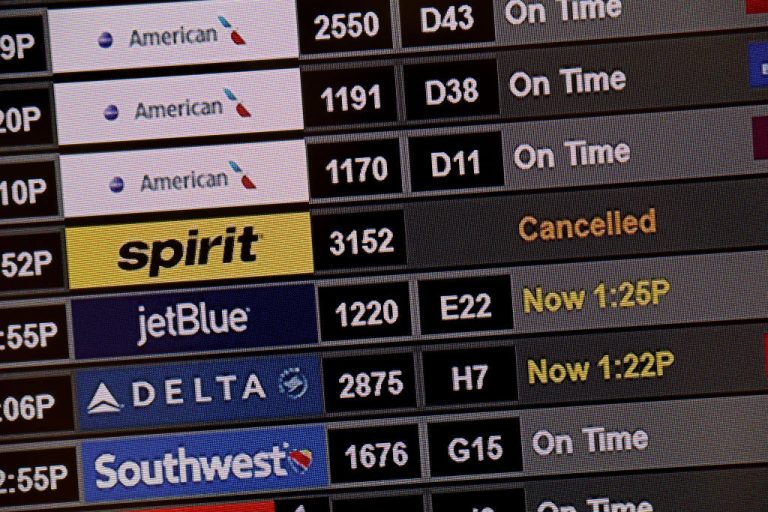With the Omicron variant showing no signs of abating and bad weather in the Pacific Northwest, several U.S. airlines have been forced to either cancel or delay their flights leading to major disruptions during the holiday season.
According to FlightAware, which provides real-time flight data, more than 1,000 flights were canceled on Monday, Dec. 27. Since Dec. 24, over 4,000 flights into, from, or inside the U.S. have been canceled.
The problem was experienced throughout the industry, with Spirit, JetBlue, American Airlines, Delta, and United Airlines all blaming cancellations on the rising COVID-19 infections. As many pilots and other crew members fell sick, they were put in quarantine, thus affecting flight schedules. Alaska Airlines and SkyWest Airlines were impacted the most. Together, both airlines saw more than 400 cancellations on Monday.
SkyWest canceled 297 flights on Dec. 27, which accounted for roughly 12 percent of its total flights. “SkyWest teams are working to recover after weather impacting several hubs, as well as increased COVID cases and quarantines amongst crewmembers, have resulted in higher than normal flight cancels through the weekend and today…We apologize for the inconvenience and are working to resume normal operations as quickly as possible,” the company said to Fox Business.
Delta Air Lines, which was one of the hardest-hit carriers during the Christmas weekend with over 370 cancellations on Sunday, said that winter weather and the Omicron variant will continue affecting its operations.
Success
You are now signed up for our newsletter
Success
Check your email to complete sign up
“Canceling a flight is always Delta’s last resort. The result is not only difficult for customers, but for our people who want nothing more than to take care of them – especially over the holidays. We sincerely apologize to everyone impacted,” John Laughter, Delta’s COO, said in a statement on Dec. 27.
Meanwhile, Alaska Airlines, which is headquartered in Seattle, reported that cancellations were not driven by sick crews. The snowstorms in the Pacific Northwest led to nearly 250 flight cancellations on Sunday and more than 100 on Monday. Out of its more than 4,000 scheduled flights, United Airlines canceled 115 flights on Monday due to its staff calling in sick. Southwest Airlines saw 67 cancellations but none of them were related to COVID-19.
Apart from the weather and the spike in Omicron infections, there were also technical issues that led to cancellations. A “temporary third-party network system outage” prompted Sun Country Airlines to cancel all of its domestic flights before 8 a.m. Central Time on Monday.
In order to address the staffing issue, major airlines have requested the Centers for Disease Control and Prevention (CDC) to shorten the period of isolation for fully vaccinated employees who test positive for COVID-19 to five days from ten. However, the suggestion was opposed by the flight attendants’ union which insisted that the matter should be decided by “public health officials, not airlines.”
Dr. Anthony S. Fauci, the nation’s top infectious-disease expert, suggested that a vaccine mandate for domestic travel would push more people to get vaccinated, thereby controlling the spread of the virus.
Bob Mann, an airline industry consultant, expects the chaos in the airlines to subside from Jan. 1, as a new schedule for staff would be implemented. He said to The Washington Post that it is difficult to determine by how much the troubles would ease as many airlines have not revealed the number of employees sidelined after testing positive for COVID-19.
There are also signs that airlines have learned from the chaotic situations which have occurred before. Many airlines are now informing customers in advance and canceling flights proactively, to prevent the kind of disorderly scenes that were witnessed this summer and fall.
















